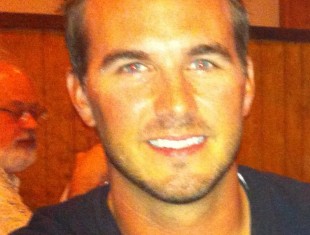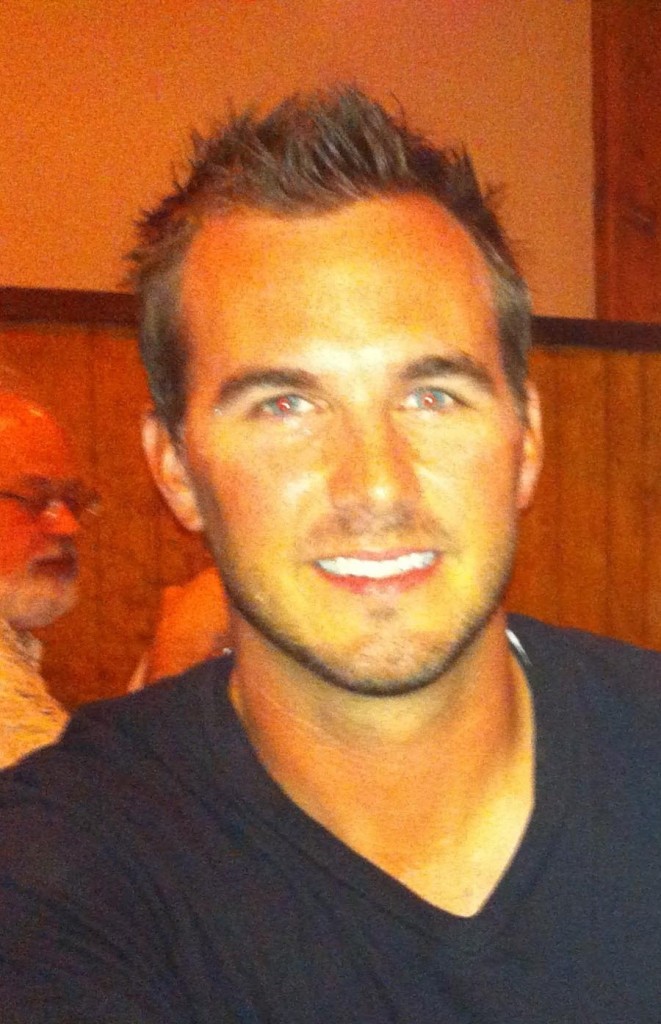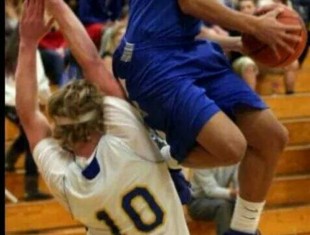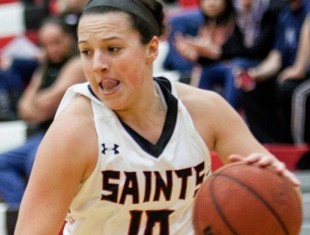By Terry Mosher
Editor, Sports Paper
Former South Kitsap academic and baseball star Travis Vetters is having some of the better experiences of his life. After a journey in professional baseball, the soon-to-be 30-year-old (he will be 30 on September 11) has settled into a position as equipment developer for Nike’s Athletic Services.
“It’s kind of a hybrid role,’ says Vetters. “My job is to develop all the Nike fielding and batting gloves for MLB and NCAA.”
In that role, Vetters gets to mingle with MLB and NCAA teams as part of a larger group that also works in marketing and design. He’s been on the job since November, but has been to spring training facilities, has gone to Japan and is about to depart for an Asia tour of Nike factories to introduce himself and to see how Nike equipment is built and to suggest better ways to do that if necessary.
Baseball has been part of Vetters life since he was very young and that has not changed. That is what is so exciting to him. He gets to be involved with what he loves, and when you love something so much it does not seem like work.
Vetters became connected to South Kitsap baseball when he reached the seventh grade at Marcus Whitman Junior High and became friends with coach Elton Goodwin’s twin boys – Joel and Jeff.
“I first saw him in the seventh grade at Marcus Whitman when I was helping Dave Colombini coach football,” says Goodwin, who coached SK to three state baseball titles and is in the Washington State Baseball Coaches Association Hall of Fame and the Kitsap Sports Hall of Fame. “He was a good athlete coming through junior high and I knew he was going to play for me. He was not very big. He was just a little (blank). And he just bonded with my boys.”
That bond grew so thick that Vetters spent much of his idle time at the Goodwin house, where Goodwin says he almost ate him out of house and home.
“He was like a son to me,” says the retired Goodwin. ‘He lived here, basically. He was here 24/7 eating all my food.”
He was like my second dad,” says Vetters. “I love that guy. I saw him a couple months ago when I visited his sons, Jeff and Joel.”
Vetters, son of Fred and Cheryl (the Vetters are now living in Minot, N.D. where Fred is working in the booming oil business as a crud haul manager), was always playing baseball when he was a young boy.
When he got to high school at SK he became involved in one of the state’s better baseball program. Goodwin had it going and in Vetters sophomore year the Wolves were 20-1, losing in the state playoffs to Sehome. His junior year they struggled, but still made the state playoffs, losing 2-1 to Shorewood.
Then in his senior year, the Wolves had a good shot at it but lost an emotional game to Woodinville 5-3 in the state semifinals. Woodinville would go on to win the state championship, 6-1, over Federal Way.
“We had them 3-0 in the third inning at Cheney Stadium,” says Goodwin of the Woodinville game. “Travis (playing third base) made three errors in three innings and that really cost us.”
Goodwin doesn’t blame Vetters. He says the Tacoma Rainiers were to play a game later that night and the groundskeeper insisted on watering down the infield.
“It was like (bleeping) mud,” Goodwin says, still fuming after all the years. “In the fifth inning, Josh (Showers) goes to make a backhand stop (at shortstop) and he slides and goes out of the game (with an injury). He was hitting .500 (actually .517) and he goes out of the game and it all falls apart. They beat us, and we should have beaten those (bleepers).”
Vetters says of the game,” Honestly, all I remember from that game was Josh Showers’ towering home run to give us a lead and then him making an incredible play up the middle and watching the ground give way under when making the throw. It looked real bad, and he had to be taken out of the game. That took the wind out of our sails and inevitably lose the game.
“If coach Goodwin said I had three errors, then I had three errors. He probably still has the book from that game. He probably has the book from every game he ever coached.”
Despite the one bad game, Vetters, who was an academic leader in the classroom (3.9 grade-point average), was also a leader on the baseball diamond for the Wolves. He hit .481 with an on-base percentage of .610 his junior season and batted .451 with a .590 OBP during his senior season in which he also pitched, going 4-0 with a 1.40 ERA.
Travis Vetters
Vetters was also nominated to the State All-Star game and the Washington vs. Oregon All-Star Series after his senior season, and was quickly offered a scholarship to play baseball at the University of Portland, which he accepted.
He played four years for Portland and coach Chris Sperry. He signed with Portland as a pitcher, but early on hurt his arm and was moved to first base. He played 45 games there his freshman year. His sophomore season he was moved to third base.
“Toward the end of the year, after 29 errors, they kicked me out to the outfield, moving me as far away from the ball as possible,” laughs Vetters. “I led the team in just about every offensive category other than home runs that year. Luckily, I had that going for me.”
Vetters played the outfield for the first time in a game against Oregon State. The Beavers’ star player at the time was Jacoby Ellsbury, who prowled centerfield for the Beavers and is now hitting around .300 for the Boston Red Sox.
Vetters threw a couple runners out in that game and he thought to himself, “This is easy. I can do this.”
So an outfielder was born, and for his last two years he was primary a rightfielder for Portland.
Vetters had visions of being picked in the 2006 MLB draft and anxiously waited to hear his name being called. But the phone call never came. It was one of the worse emotional roller coaster moments of his life.
He had played at Portland with pitcher Joe Jones, the son of longtime Los Angeles Dodgers’ scout Hank Jones, and that connection paid off in the end. The Dodgers selected Jones with their 18th pick in the 2006 MLB Draft (553rd pick overall) and three weeks after the draft Vetters was on a beach hanging out with friends when his phone rang.
It was Hank Jones.
“How would you like to be a Dodger?” Jones asked. “I said, ‘You got to be kidding.’ That was on a Thursday and on Saturday I was in Vero Beach (Florida) at Dodgertown. It was a dream come true. I joke that I signed for a plane ticket and a map.”
Vetters said Dodgertown felt like home.
“When you sign you are part of a family,” he says. “It’s a family tradition that they have in Dodgertown (the Dodgers are no longer in Vero Beach, but in Arizona). Then when you get there, the work begins.”
Vetters was struck by the quality of competition.
“When I showed up I was 22 and had four years of college,” he says. “There were 16 and 17-year-old kids that were six-foot-four and 250 pounds hitting home runs from both sides of the plate. The talent was unbelievable. I was just hoping to get an opportunity and then I see these kids from all over the world, just not America, and the skill level was at another level.
“I got there the same year as (pitcher) Clayton Kershaw, and you can see now what he is doing on the Major League level (13-8, a 1.72 ERA for the Dodgers). That is what I was facing, guys like that in intra-squad games. It was just unbelievable.”
Vetters would play four years in the Dodgers’ organization. He started out like many new players in the rookie Gulf Coast League where he played 14 games and hit .146. The next year (2007) he was moved to short-A Ogden (Utah) where he played 57 games and batted .315 with 14 home runs and an amazing OPS of 1.026.
“I had a very good year,” says Vetters, who played right field.
The next season (2008) he made the low-A Great Lakes Loons team in Midland, Michigan in the Midwest league.
“I was the fourth outfielder and (usually) came off the bench in the sixth inning to pinch hit,” says Vetters/
He was hitting .218 when he was demoted back to Ogden where he was expected to provide veteran leadership to a very young team.
“I was excited because I was going to play and help a team that was young,” says Vetters.
Ogden was 0-10 when he got there and with his help the team, which had Dee Gordon playing shortstop and leading off, righted itself and reached the .500 mark at the halfway mark and played 10 games over .500 to make the playoffs.
Vetters did his thing, hitting .404 with nine home runs.
He did miss three weeks of the season after being injured in a brawl.
“I ended up dislocating my shoulder and tearing my labrum in my left shoulder,” says Vetters. “I got the blunt of the brawl.
What happen is Gordon was at-bat with Vetters on in the on-deck circle. There was some lingering problems from the previous game and on the first pitch to Gordon, who led off, was behind him. The second pitch hit him in the back, and before Vetters knew it both benches emptied and rushed the mound.
“’It is kind of blurry from there,” says Vetters. “Everything happened so fast. It was one of those fight or flight moments. I climbed out of a dog pile with a dislocated arm and at the end of the season I had surgery on my shoulder.”
Next in Part II: Vetters’ baseball career ends and he eventually winds up with a dream job.





